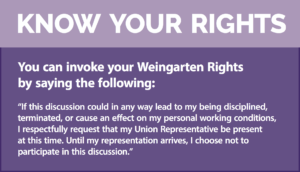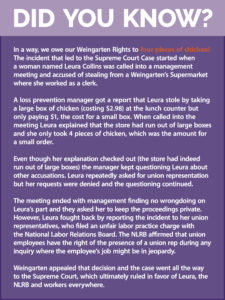
A bargaining unit employee has the legal right to be represented by its union at an investigatory interview with his or her supervisor when the employee reasonably believes that the interview may lead to a disciplinary action.
U.S. Supreme Court ruling:
The rights of unionized employees to the presence of union representatives during investigatory interviews was decided by the U.S. Supreme Court in 1975 in NLRB v. J. Weingarten, Inc. Since the employee was being investigated by the Weingarten Company, these rights have become known as Weingarten Rights.
What is an investigatory interview?
An investigatory interview occurs when an employer questions an employee to obtain information which could be used as a basis for discipline. If an employee has a reasonable belief that discipline or other adverse consequences may result from what he or she says, the employee has a right to request union representation.

Investigatory interviews usually relate to subjects such as:
violation of work procedures
absenteeism
insubordination
poor attitude
violation of safety rules accidents
sabotage
work performance
damage to state property falsification of records lateness
theft
drinking
fighting
drugs
Here are some scenarios to look out for:
-If you are called into a supervisor’s office and there are other department heads there such as someone from Human Resources, the Legal department, etc., you may want to invoke your Weingarten rights
-If during the course of the meeting, management starts asking for facts or “your side of the story,” you may want to invoke your Weingarten rights
-If the purpose of the meeting or interview is to investigate an employee’s allegedly inadequate work performance or other misconduct, you may want to invoke your Weingarten rights
Remember: You can ask for a union rep AT ANY TIME during the meeting.
Weingarten Rules:
Under the Supreme Court’s Weingarten decision, when an investigatory interview occurs, the following rules apply:
RULE 1
The employee must make a clear request for union representation before or during the interview. The employee cannot be punished for making this request.
RULE 2
After the employee makes the request, the employer must choose from among three options. The employer must:
Grant the request and delay questioning until the union representative arrives and has a chance to consult privately with the employee; or
Deny the request and end the interview immediately; or
Give the employee a choice of:
(1) having the interview without representation or
(2) ending the interview.
RULE 3
If the supervisor denies the request for union representation and continues to ask questions, he or she commits an unfair labor practice and the employee has the right to refuse to answer. The supervisor cannot discipline the employee for such a refusal.
Rights of union representatives:
Supervisors often assert that the only role of a Union representative at an investigatory interview is to observe the discussion, i.e., to be a silent witness. The Supreme Court, however, clearly acknowledged a union representative’s right to assist and advise workers during the interview.
The employer must inform the employee and the union representative of the subject matter of the interview; i.e., the type of conduct for which discipline is being considered (theft, lateness, drugs, etc.).
The union representative may engage in a private pre- interview conference with the employee before questioning begins.
The union representative must be allowed to speak during the interview. The union representative , however, does not have the right to bargain over the purpose of the interview.
The union representative can request that the supervisor clarify a question so the worker can understand what is being asked.
After a question is asked, the union representative can give advice on how to answer. When the questioning ends, the union representative can provide information to the supervisor.
It must be emphasized that if the Weingarten rights are complied with, union representatives have no right to tell workers not to answer questions or to give false answers.
Know the limits:
Just as it’s important to know what your Weingarten rights are, it is also important to know the limits.
Workers are not entitled to have a representative present every time a supervisor wants to talk to them. If the discussion begins to change into questioning that could lead to discipline, employees have the right to ask for representation before the conversation goes any further. If you are called into the supervisor’s office for an investigation, you can’t refuse to go without your representative. All you can do is refuse to answer questions until your union representative gets there and you’ve had a chance to talk things over with them.

 Share
Share
 Share
Share